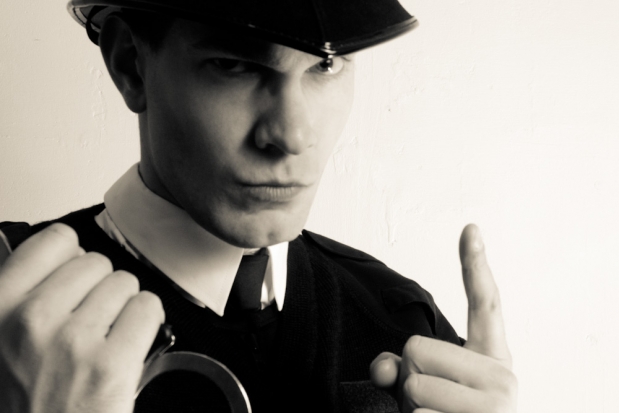
This is my Tech Editor face. If you see it, you're in trouble.
I am quite in demand as a technical editor for photography books, as you can see from the list of books I have listed on my 'company' web site, But what does a tech editor do? And what is the difference between a good and a bad tech editor?
When the books I wrote went through the technical editor mill, I have to admit that I was a little bit disappointed - Sure, I was incredibly grateful for getting feedback on my writing, but the 'feedback' was limited to only actual technical errors. I figured 'damn, here's a fantastic opportunity to get some insights from a fellow photography author, but all I am getting is "This picture appears to be taken with a larger aperture than indicated. Please confirm".
When that happened, I figured that I could do a better job than that, and contacted my publishers to see if I could help out. It turns out it isn't very well paid - I mean, the pay isn't horrible, but it's nowhere near my normal freelance / consulting rates. So why do I bother?
What I get out of technical editing
Between you and me, I get a lot more out of tech editing than just the money. It is exciting to be involved in the production of new books, for one thing. It is also very interesting to see manuscripts in their raw form, and to realise that authors differ wildly in lots of different ways. Some authors write their books very tightly integrated (i.e. the photos illustrating points are key to each individual chapter, and it seems as if the chapters are written around a set of illustration images), others are less integrated.
Some authors can barely string a sentence together (which is fine - that's where the copy-editors come in. The important part is the content, after all), whilst others deliver flowing prose that verges on poetry. And, as you might imagine, there are a lot of people that are teetering somewhere in-between. I'm quite happy to admit that I've learned a lot from tech-editing other author's books - and there can be little doubt about that I'm a better writer for it myself.
Of course, I also get the fuzzy feeling of knowing that someone else's book is a tiny little bit more accurate, more complete, and a smidgeon better because I was involved.
What does the technical editor add to the manuscript?
I can only speak about what I do myself, really, but it's a pretty thorough process:
Check all factual information in the manuscript - That includes names mentioned (Is it the right person? Is their name spelled correctly?), dates listed (do the dates make sense? Do they match the EXIF data of the images being used as examples?), any photographic equipment used (are they still on sale? Does the equipment do what the author claims it does?), etc.
Look at every photo in detail, at 100% magnification - Are they sharp and in focus? Do they need further post-processing to look good in print? Is the white balance correct? How do the images look in context with other photos in the same chapter?
Check the EXIF data of every image - You'd be amazed how easy it is to get the camera data muddled up in captions: A 1/160 second shutter speed turns into a 1/60 second shutter speed, for example, or the author writes that they were shooting wide-open with a 17mm lens whilst the EXIF data seems to think we are talking about different equipment. It isn't the end of the world, of course, but if a publisher is going to go through the trouble of hiring a technical editor, we may as well get it perfect - especially if people are going to try to use the exposure settings as starting points for their own photographs.
Query any inconsistencies - Some times, you look at a photo and think "There is no way this image was taken in the way the photographer says". Perhaps the lighting is off; maybe there's some reflection that shows that they used another piece of equipment, etc.
Finally, I will go through and see if I can think of any key pieces of information or advice that have been missed out. Do I know of any great tips, alternative ways of doing things, or faster methods to accomplish the same result? If so, it goes into my tech editing notes.
What happens with the tech editing notes?
The tech editor's notes go back to the author of the book - who then gets to decide whether to do anything with the advice. Some times, they might decide to rewrite a section, they may just update the text or caption based on my comments - or they might decide that they disagree with my comments, and simply move along and leave it as-is.
Not changing anything based on the technical editor's comments or suggestions is okay, of course - the author is the boss. Personally, I find that sometimes the technical editor has misunderstood my point, that there wasn't a factual issue, but that the explanation was too poor, and that that led to confusion.
So how can I hire a tech editor?
There are a lot of good photography tech editors out there, and a quick google search should help you on your way. Or you could just point your browser at my site, and see if I can't help you out, of course :)
Do you enjoy a smattering of random photography links? Well, squire, I welcome thee to join me on Twitter - Follow @Photocritic
© Kamps Consulting Ltd. This article is licenced for use on Pixiq only. Please do not reproduce wholly or in part without a license. More info.





